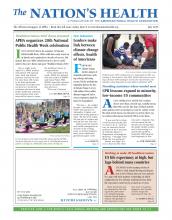Patients who have difficulty understanding medical forms and medication labels may face a higher risk of dying from acute heart failure, according to a recent study.
The findings come from research published April 29 in the Journal of the American Heart Association.
The study tracked more than 1,300 patients hospitalized for acute heart failure who were discharged between November 2010 and June 2013 and followed through the end of the year. Acute heart failure happens when new symptoms of heart failure emerge or when usual symptoms such as shortness of breath worsen, said lead study author Candace McNaughton, MD, MPH, an assistant professor at Vanderbilt University’s Department of Emergency Medicine.
“Heart failure affects more than 5 million Americans, is a frequent cause of hospitalization and by 2030 is projected to cost as much $70 billion,” McNaughton told The Nation’s Health. “So there is a lot of interest in helping patients with heart failure manage their condition.”
Researchers assessed patient health literacy by asking three questions on a one- to five-point scale about patient confidence filling out health care forms, problems with learning and reading ability. When added together, low health literacy was a score less than 10.
More than 320 patients had low health literacy and of those, 124 people, or 38.3 percent, died. Of the more than 1,000 patients with higher health literacy levels, 279 people, or 26.5 percent, died.
The study found that patients with low health literacy had a 32 percent higher risk of dying from acute heart failure compared with patients with higher literacy levels after adjusting for factors such as race, gender and age. Patients with lower health literacy tended to be older, male, people who had not finished high school and federal or state health insurance recipients.
“This study suggests that clear communication between patients and health care providers is very important,” McNaughton said. “It is important for health care providers to be aware of their patients’ health literacy skills, or their ability to read, understand and use health information. Some people who are highly literate or highly educated in other areas may have difficulty reading and understanding health care information. Patients with lower health literacy skills may have difficulty communicating with health care providers, navigating the health care system, recognizing signs of health decline and knowing when and who to contact when they do become ill.”
McNaughton said patients need to feel empowered to ask their health care providers questions about proper medication use as well as how to balance that with managing other chronic conditions, such as diabetes.
“Our ongoing research is working on better understanding what exactly hospitals and providers can do to make a difference, although there are many unanswered questions,” McNaughton said. “When we identify low health literacy levels, should we simplify medication regimens? Follow patients in the outpatient setting more frequently or sooner after discharge? Give them extra resources like home health care? We don’t know the answers to these questions yet.”
For more information, visit http://jaha.ahajournals.org/content/4/5/e001799.abstract.
- Copyright The Nation’s Health, American Public Health Association









